人教版必修2 unit 3 computer课文理解
- 格式:ppt
- 大小:3.48 MB
- 文档页数:22
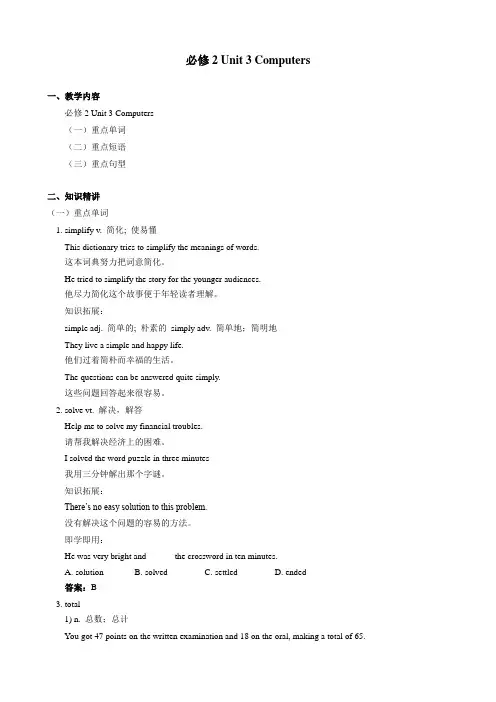
必修2 Unit 3 Computers一、教学内容必修2 Unit 3 Computers(一)重点单词(二)重点短语(三)重点句型二、知识精讲(一)重点单词1. simplify v. 简化; 使易懂This dictionary tries to simplify the meanings of words.这本词典努力把词意简化。
He tried to simplify the story for the younger audiences.他尽力简化这个故事便于年轻读者理解。
知识拓展:simple adj. 简单的; 朴素的simply adv. 简单地;简明地They live a simple and happy life.他们过着简朴而幸福的生活。
The questions can be answered quite simply.这些问题回答起来很容易。
2. solve vt. 解决,解答Help me to solve my financial troubles.请帮我解决经济上的困难。
I solved the word puzzle in three minutes我用三分钟解出那个字谜。
知识拓展:There’s no easy solution to this problem.没有解决这个问题的容易的方法。
即学即用:He was very bright and ______the crossword in ten minutes.A. solutionB. solvedC. settledD. ended答案:B3. total1) n. 总数;总计You got 47 points on the written examination and 18 on the oral, making a total of 65.你笔试得了47分,口试得了18分,总分65分。
The repairs come to over $ 500 in total.修理费总共500多美元。
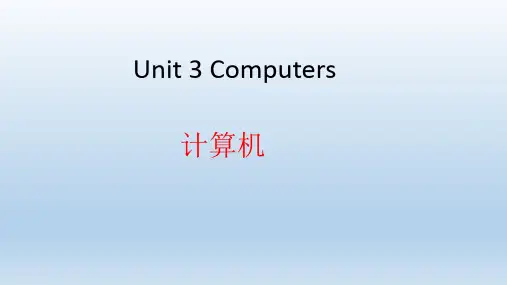
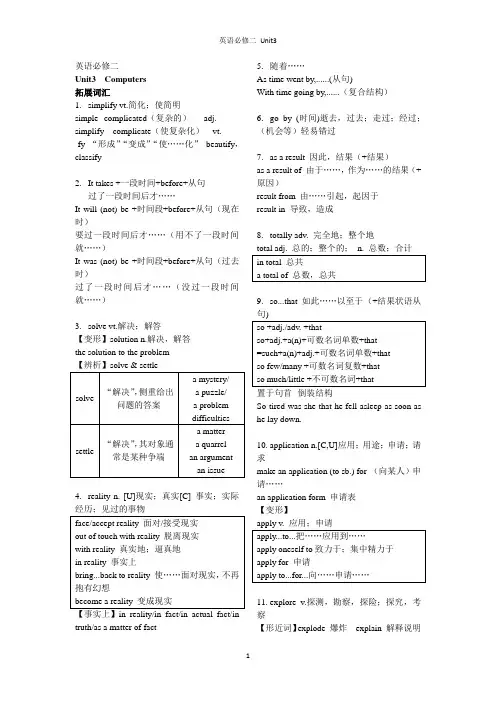
英语必修二Unit3 Computers拓展词汇1.simplify vt.简化;使简明simple--complicated(复杂的)adj. simplify---complicate(使复杂化)vt.-fy “形成”“变成”“使……化”beautify,classify2.It takes +一段时间+before+从句过了一段时间后才……It will (not) be +时间段+before+从句(现在时)要过一段时间后才……(用不了一段时间就……)It was (not) be +时间段+before+从句(过去时)过了一段时间后才……(没过一段时间就……)3.solve vt.解决;解答【变形】solution n.解决,解答the solution to the problem【辨析】solve & settle4.reality n. [U]现实;真实[C] 事实;实际truth/as a matter of fact5.随着……As time went by,......(从句)With time going by,......(复合结构)6.go by (时间)逝去,过去;走过;经过;(机会等)轻易错过7.as a result 因此,结果(+结果)as a result of 由于……,作为……的结果(+原因)result from 由……引起,起因于result in 导致,造成8.totally adv. 完全地;整个地9.so...that 如此……以至于(+结果状语从句)置于句首--倒装结构So tired was she that he fell asleep as soon as he lay down.10.application n.[C,U]应用;用途;申请;请求make an application (to sb.) for (向某人)申请……an application form 申请表【变形】11.explore v.探测,勘察,探险;探究,考察【形近词】explode 爆炸explain 解释说明export 出口,输出12.anyhow adv.1)(转换话题、结束谈话或回到原话题时说)无论如何,反正Anyhow I don’t like it.2)而且,加之,反正I don’t want to go out and anyhow it is raining.3)尽管,即使这样I am afraid I can’t come, but thank you anyhow.13.goal n.14.of high qualityof +修饰词(high,great,little,some,no 等)+抽象名词(value,importance,use,help,interest等)作定语或表语=adj.15.intelligent adj. 智能的,聪明的intelligent machines/systems 智能机器/系统【变形】intelligence n.智力;才智;智慧intelligence quotient =IQ智商e true 实现,成为现实(无被动)become a reality 实现realize 实现17.give away捐赠,赠送;分发,颁发;泄露,暴露18.signal1) v. 发信号;示意2)n.信号,暗号a danger/warning signal 危险/警告traffic signals 交通信号19.personally adv.1)就个人而言=in one’s opinion2)本人;亲自by oneself20.in a way =in one/some way在某种程度上in the way/in one’s way 挡道,碍事in this/that way 以这种/那种方式in any way 在任何方面by the way 顺便说一下,顺便问一下by way of 经由……on one’s/the way to 在去……的途中in no way 决不,一点儿也不21.arise vi.1)出现;发生,产生2)(由……)引起;(因……)产生22.make up1)组成,构成被动形式be made up of2)编造,虚构3)化妆,打扮4)弥补(常与for连用)23.after all1)终究;归根结底(结果与预想不同,句尾)2)毕竟,别忘了(解释或说明理由,句首at all 完全,根本(否定,疑问,表条件的从句) not ...at all 一点也不above all 首先,最重要的是,强调最重要的in all 总共,总计=in total24.with the help of sb. =with one’s help 在……的帮助下;借助(be)of great help 非常有帮助come to one’s help 来帮某人的忙can't help but do sth. 不得不做某事can't help doing sth. 忍不住做某事help...out 帮助……摆脱困境help oneself to 自用;自取25.deal with1)对待;对付;处理2)与……交易3)论及;涉及how to deal with...what to do with...26.watch over1)看管;照顾。
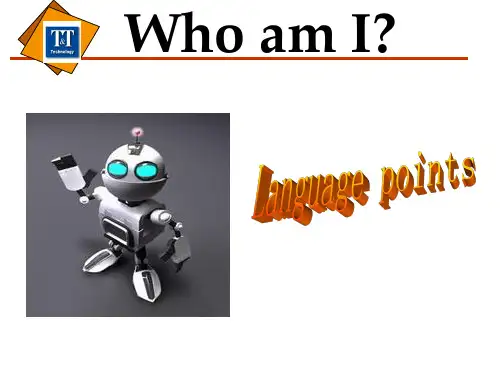
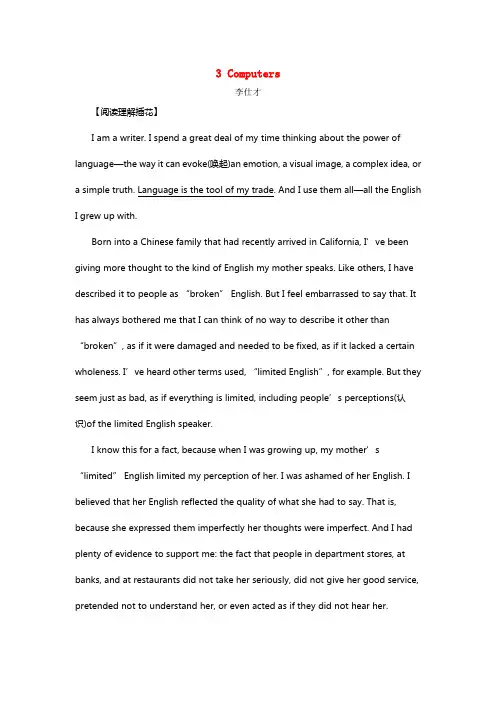
3 Computers李仕才【阅读理解插花】I am a writer. I spend a great deal of my time thinking about the power of language—the way it can evoke(唤起)an emotion, a visual image, a complex idea, or a simple truth. Language is the tool of my trade. And I use them all—all the English I grew up with.Born into a Chinese family that had recently arrived in California, I’ve been giving more thought to the kind of English my mother speaks. Like others, I have described it to people as “broken” English. But I feel embarrassed to say that. It has always bothered me that I can think of no way to describe it other than “broken”, as if it were damaged and needed to be fixed, as if it lacked a certain wholeness. I’ve heard other terms used, “limited English”, for example. But they seem just as bad, as if everything is limited, including people’s perceptions(认识)of the limited English speaker.I know this for a fact, because when I was growing up, my mother’s “limited” English limited my perception of her. I wa s ashamed of her English. I believed that her English reflected the quality of what she had to say. That is, because she expressed them imperfectly her thoughts were imperfect. And I had plenty of evidence to support me: the fact that people in department stores, at banks, and at restaurants did not take her seriously, did not give her good service, pretended not to understand her, or even acted as if they did not hear her.I started writing fiction in 1985. And for reasons I won’t get into today, I began to write stories using all the English I grew up with: the English she used with me, which for lack of a better term might be described as“broken”, and what I imagine to be her translation of her Chinese, her internal(内在的)language, and for that I sought to preserve the essence, but neither an English nor a Chinese structure.I wanted to catch what language ability tests can never show: her intention, her feelings, the rhythms of her speech and the nature of her thoughts.【文章大意】本文主要记叙了作者在不同时期对母亲所利用的语言的不同观点。
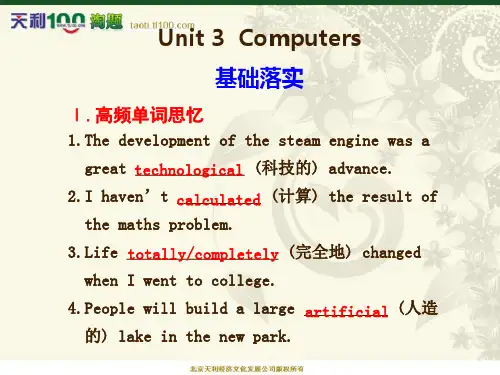
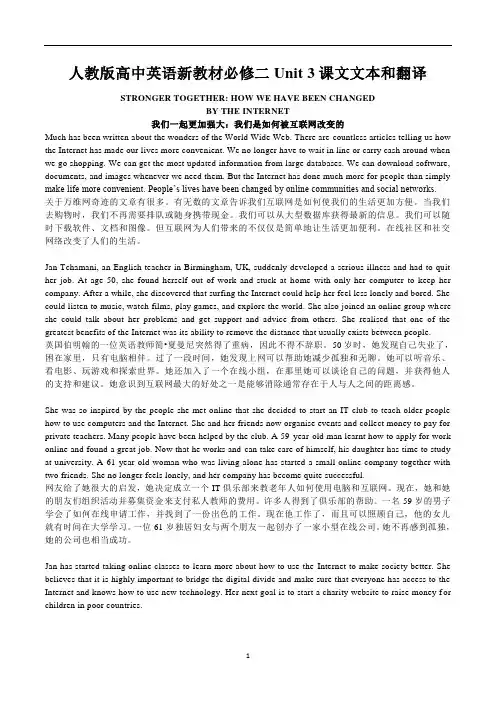
人教版高中英语新教材必修二Unit 3课文文本和翻译STRONGER TOGETHER: HOW WE HAVE BEEN CHANGEDBY THE INTERNET我们一起更加强大:我们是如何被互联网改变的Much has been written about the wonders of the World Wide Web. There are countless articles telling us how the Internet has made our lives more convenient. We no longer have to wait in line or carry cash around when we go shopping. We can get the most updated information from large databases. We can download software, documents, and images whenever we need them. But the Internet has done much more for people than simply make life more convenient. People’s lives have been changed by online communities and social networks.关于万维网奇迹的文章有很多。
有无数的文章告诉我们互联网是如何使我们的生活更加方便。
当我们去购物时,我们不再需要排队或随身携带现金。
我们可以从大型数据库获得最新的信息。
我们可以随时下载软件、文档和图像。
但互联网为人们带来的不仅仅是简单地让生活更加便利。
在线社区和社交网络改变了人们的生活。
Jan Tchamani, an English teacher in Birmingham, UK, suddenly developed a serious illness and had to quit her job. At age 50, she found herself out of work and stuck at home with only her computer to keep her company. After a while, she discovered that surfing the Internet could help her feel less lonely and bored. She could listen to music, watch films, play games, and explore the world. She also joined an online group wh ere she could talk about her problems and get support and advice from others. She realised that one of the greatest benefits of the Internet was its ability to remove the distance that usually exists between people.英国伯明翰的一位英语教师简•夏曼尼突然得了重病,因此不得不辞职。
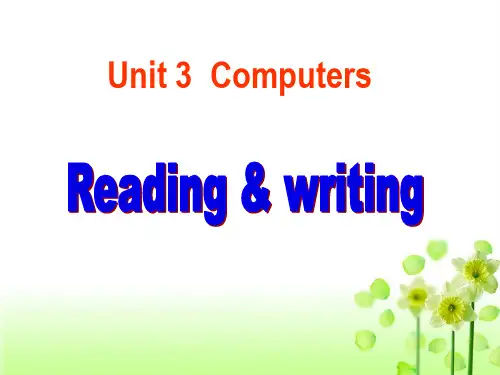
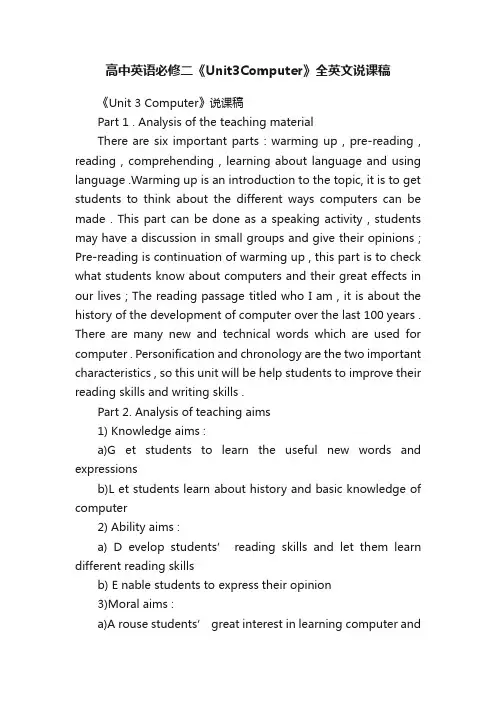
高中英语必修二《Unit3Computer》全英文说课稿《Unit 3 Computer》说课稿Part 1 . Analysis of the teaching materialThere are six important parts : warming up , pre-reading , reading , comprehending , learning about language and using language .Warming up is an introduction to the topic, it is to get students to think about the different ways computers can be made . This part can be done as a speaking activity , students may have a discussion in small groups and give their opinions ; Pre-reading is continuation of warming up , this part is to check what students know about computers and their great effects in our lives ; The reading passage titled who I am , it is about the history of the development of computer over the last 100 years . There are many new and technical words which are used for computer . Personification and chronology are the two important characteristics , so this unit will be help students to improve their reading skills and writing skills .Part 2. Analysis of teaching aims1) Knowledge aims :a)G et students to learn the useful new words and expressionsb)L et students learn about history and basic knowledge of computer2) Ability aims :a) D evelop students’ reading skills and let th em learn different reading skillsb) E nable students to express their opinion3)Moral aims :a)A rouse students’ great interest in learning computer andlet them learn computers in daily livesb) Develop students’ sense of cooperative learningPart 3. Teaching important points:1) L et students learn more about history of the development and basic knowledge of computer2) Get students learn different reading skillsPart 4. Teaching difficult points:1) Develop students’ reading ability2) Enable students to learn to express their opinions3) Let students learn to use personification and chronology when writing .Part 5. Teaching methods :1)Task-based teaching and learning2) Cooperative learning3) Discussion(Purpose of my designing: “Task-based” teachin g method is used here to develop the students' ability of communication and also their ability of cooperation will be well trained. Tell the students to be polite and take good care of our things.) Part 6. Analysis of teaching procedureStep 1. Warming up1. Warming up by looking and discussingShowing the following pictures and discuss what they have in common and what do you think will be the next developmopient of the computer . The following expressions can be given as a help in their discussion . ( I think that ..., in my opinion ...,i believe that ...)2.Warming up by talking about computersStep 2. Pre-reading1.Ask and answering ─predict what it is going to be about by looking the pictures and the title.2 . Discussing and sharingStep 3 . Reading1. PredictingAsk students to look at the title and the picture to guess what the passage might about . Let one or two students to give their opinions.2. SkimmingGive students 2 minutes , and ask them to read the passage fast for the topic sentence of each paragraph3. ScanningGive students 4 minutes , and ask them to read the passage carefully to answer the some questions . Before students read the passsage , tell them to pay attention to the hints of the time .Step 4. Learning personificationDiscuss who is the speaker and the characteristics of this text , then sum up the concept of the personification .Step5 . Learning chronologyAsk students how the passage is organized and sum up the concept of the chronology .Step6 . consolidationHave students get prepared in 3 minutes and then try to retell the developmemt of the computer with their own words , using chronology .Step 7 . Homework1. Finish off the related exercises .2. Go over the text , and learn all the new words and expressions in this text by heart .。
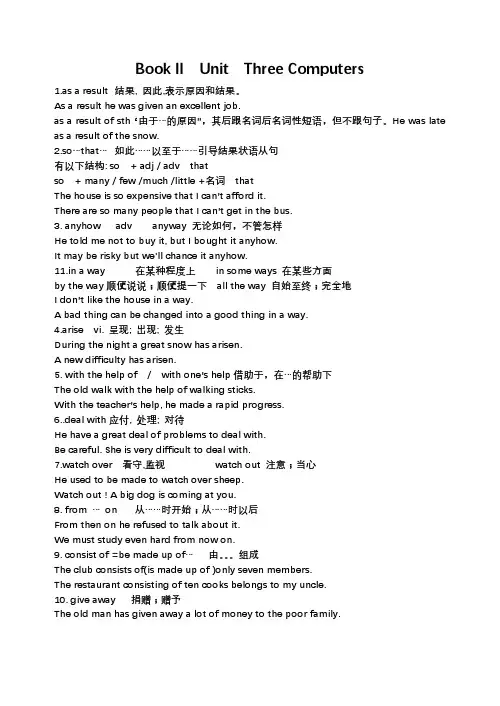
Book II Unit Three Computers1.as a result 结果, 因此,表示原因和结果。
As a result he was given an excellent job.as a result of sth “由于…的原因”,其后跟名词后名词性短语,但不跟句子。
He was late asa result of the snow.2.so…that…如此……以至于……引导结果状语从句有以下结构: so + adj / adv thatso + many / few /much /little +名词thatThe house is so expensive that I can’t afford it.There are so many people that I can’t get in the bus.3. anyhow adv anyway 无论如何,不管怎样He told me not to buy it, but I bought it anyhow.It may be risky but we'll chance it anyhow.11.in a way 在某种程度上in some ways 在某些方面by the way顺便说说;顺便提一下all the way 自始至终;完全地I don’t like the house in a way.A bad thing can be changed into a good thing inaway.4.arise vi. 呈现; 出现; 发生During the night a great snow has arisen.A new difficulty has arisen.5.with the help of / with one’s help借助于,在…的帮助下The old walk with the help of walking sticks.With the teacher’s help, he made a rapid progress.6..deal with应付, 处理; 对待He have a great deal of problems to deal with.Be careful. She is very difficult to deal with.7.watch over 看守,监视watch out 注意;当心He used to be made to watch over sheep.Watch out ! A big dog is coming at you.8. from …on 从……时开始;从……时以后From then on he refused to talk about it.We must study even hard from now on.9. consist of =be made up of…由。
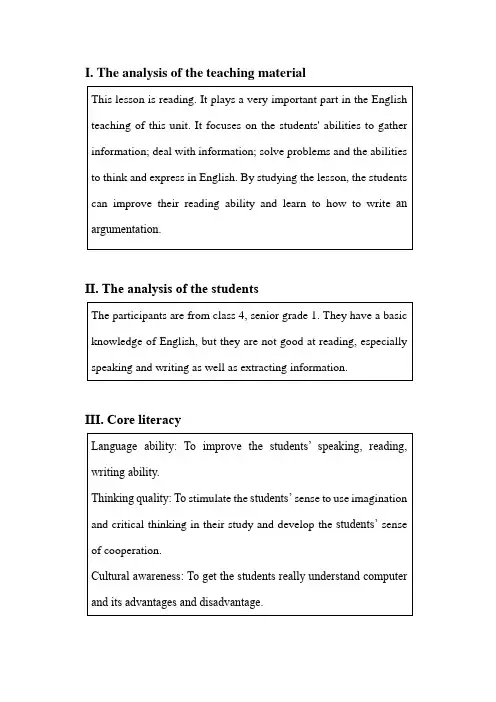
新人教版高中英语必修2《Unit 3 Computers》精品教案Language learning & usingLearning goals1. Master the usages of key words & phrases.2. Learn to use them.3. Develop the spirit of teamwork.Important pointsas a result, with the help of, in a way, deal with, so…that…Teaching proceduresⅠ.Revison1). Match the words with the correct meanings.1. network A. to work out the anwer to a problem2 . simplify B. the practical use of sth ,especially a theory ,or a discovery3. solve C. completely4. explore D. anyway5. totally E. to make things easier6. anyhow F. to travel around an area to find out sth about it7. goal G. connected computer system8. application H. sth that you hope to achieve2).Fill in the blanks according to the text.In 1642, the computer began as a ①(计算) machine,which could ②(简化)difficult sums. It could think ③(合逻辑地). From 1936 on, the computer could be made to ④s any difficult mathematical problom.⑤time went by, ⑥(技术) revolution made the computer change a lot. The memory of computers developed so much ⑦computers could deal with many probloms. Nowadays computers have been put into space to ⑧e the space. Anyhow, the computer’s ⑨g is to provide ⑩(人类)with happiness.nguage learning & using1. personal adj.【原句再现】First as a PC(personal computer)and then as a laptop, I have been used in offices and homes since the 1970s.观察探究①This novel is written from personal experience.②Those are my personal letters.You have no right to read them.③The host gives us a warm personal welcome.归纳:personal adj.①____________ ②____________ ③____________personally adv.观察探究①Personally, I am against his plan.②The host welcomed his guests personally.归纳:personally ①____________ ②____________2. as a result【原句再现】As a result I totally changed my shape.观察探究①It doesn't often rain in summer. As a result,we have to water the garden.②As a result of the accident, he became lame(跛).as a result意思是_______,只能单独用;as a result of= ___ _ __, 意思是_______ 即学活用A. 用as a result或as a result of 填空。